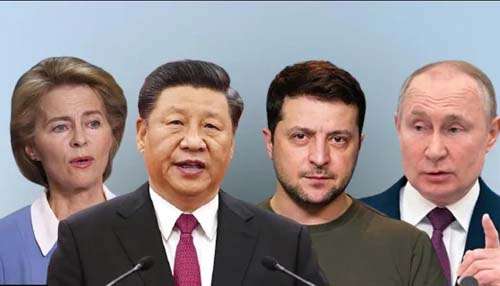
Talk is vital for mutual understanding, but China won’t hesitate to fight back West’s smear
Wang Wen
Because of my occupation, I often come into contact with many foreigners. Recently, I participated in many webinars with think tanks from the US and Europe, and also communicated with diplomats from a number of Western embassies in China. They put forward some common views on sensitive issues such as the Russia-Ukraine conflict and China’s economy. I’d like to share my views.
The first question most have is how could China’s GDP growth of the first quarter be 4.8 percent given the serious impact of the epidemic in Shanghai. This question underlines doubts about the credibility of China’s official statistics.
The answer to this question is not only an economic one, but a political one. We should trust the resilience of the Chinese economy. The anxiety caused by the epidemic in Shanghai is completely understandable. But I always believe when we look at China from a long-term perspective, short-term problems will be solved. Just imagine, if we follow the US and Europe to completely “open” our society, more and more elderly people would die, and wouldn’t the problem be more serious then? A long-term view of China requires a rational view of China’s national conditions and belief in China’s development.
The second question is: why didn’t China condemn Russia’s military action in Ukraine and why not call it an “invasion”? I would argue that big countries have wider security borders than smaller ones – just as the US could not bear the Soviet Union’s deployment of missiles in Cuba in 1962. Similarly, it used “washing powder” as an excuse to conduct a preemptive war against Iraq in 2003. Why didn’t Western countries blame US invasion?
I often cite an example. If you see two people fighting, you should first try to persuade them, then discuss why they fight, and then decide who is right and who is wrong. The current logic of the West is that the one who makes the first move is definitely wrong, therefore it calls on everyone to unite and punish the one who makes the first move and those who do not follow the sanctions are also responsible. This logic looks domineering, but in fact it is not legal, ethical or justified.
Even an article in The New York Times recently said that the West is isolated by the world. It just proves the correctness of China’s current position and the fallacy of Western logic. Now some Western diplomats and media’s focus on “why China didn’t condemn Russia’s invasion” is actually diverting the topic and avoiding the complicated reasons behind the war. Foreigners should attach more importance to who is the real initiator behind the scene.
China’s position is consistent and logical. Countries should first respect each other, and then resolve through consultation. What if they can’t do these two things? China believes that they should remain peaceful all the same. What if peace can’t be maintained and a war breaks out? Then the case should be judged on the basis of right and wrong.
China should oppose war as well as sanctions. In the past 40 years, China has been the major country least willing to go to war, pursues peace the most, and imposes the least sanctions on other countries. The condemnation of war should not be biased toward any side, nor should it be a double standard. From this perspective, China is the most objective and neutral nation.
The third question concerns Taiwan island. Think tank scholars and diplomats from Western countries often talk about the Taiwan question and claim that China is too sensitive toward it. They assert that the visit to Taiwan by their former officials did not represent the position of their governments.
I don’t agree with it. The Taiwan question is the red line of the Chinese nation and should not be crossed. Some politicians from the US and Western countries play the tricks and send former government officials to Taiwan, and blame China for not understanding their system. They could only expect sanctions or countermeasures from the Chinese government.
I have often reminded diplomats of some Western countries that what they should be most worried about now is that the US strategy of “containing Russia by making use of Ukraine” has gained certain advantage – and this may prompt the US to initiate a war in the Taiwan Straits as well so as to realize the goal of “containing China by making use of Taiwan and slowing down the speed of China’s rise.” This is a gamble. In that case, one should expect China’s countermoves. It will be a disaster for mankind, but the West will pay for the consequences.
Now the conflict in discourse and ideology between China and the West is serious. The root cause is that the West has not been able to accept and adapt to the way of engaging with China after the rise of China. Western countries have deep misunderstandings of China. We should communicate with and listen to them, and we should pay heed to what is right and refute what is wrong.
The writer is professor and executive dean of Chongyang Institute for Financial Studies at Renmin University of China
